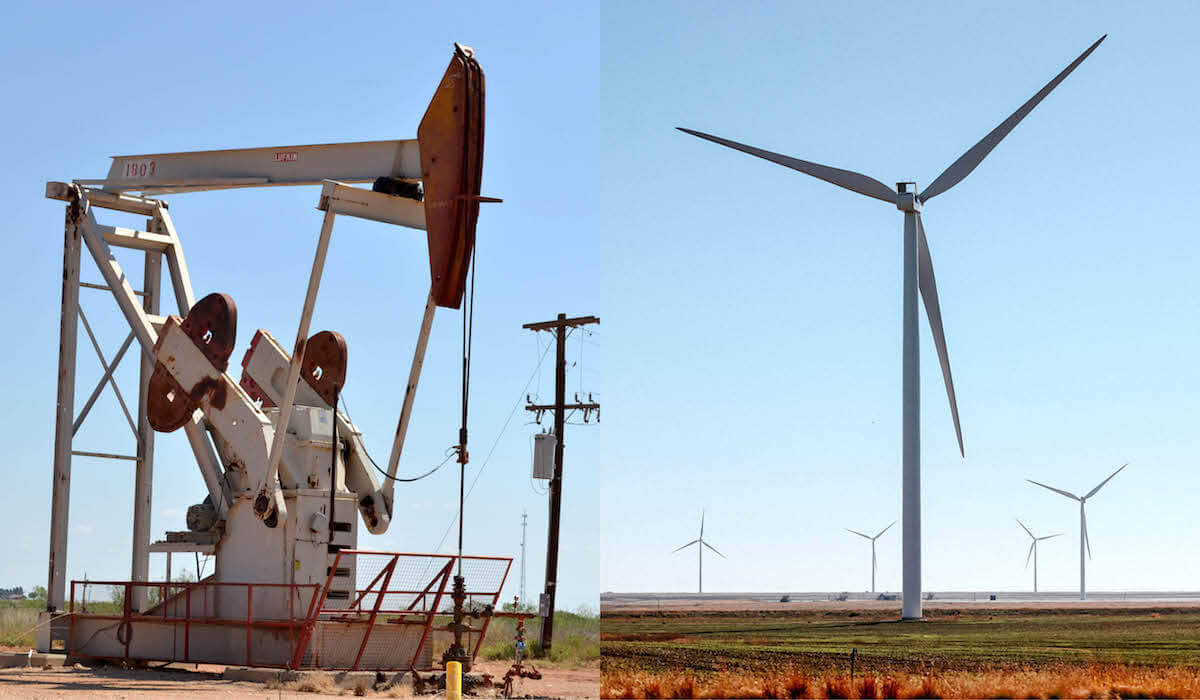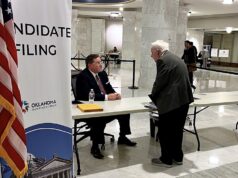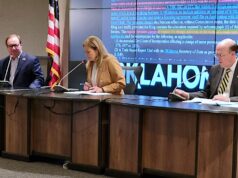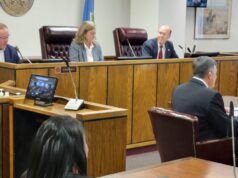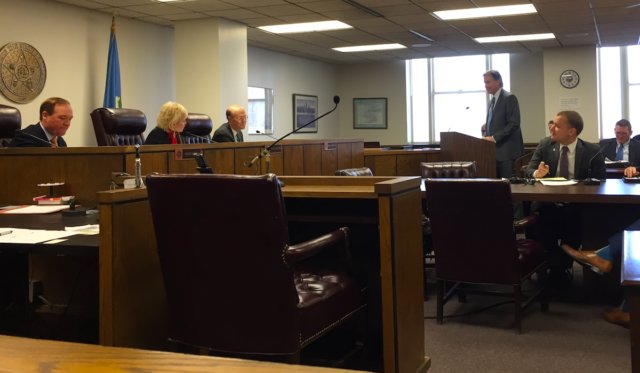

With Public Service Company of Oklahoma seeking “pre-approval” of its $4.5 billion Wind Catcher project from the Oklahoma Corporation Commission, the state’s attorney general argued this morning that “rules matter” and the utility company had not proven “the need for this project.”
But after more than an hour’s worth of arguments and questions, members of the Oklahoma Corporation Commission appeared split on whether to deal a substantial blow to the project, move it beyond Hunter’s objection or punt.
“We could vote to grant this motion to dismiss. We could vote to deny this motion to dismiss, or we could do what we usually do and do nothing,” longtime Commissioner Bob Anthony said.
After terse rebuttal of the notion that the commission is wont to “do nothing,” Commission Chairwoman Dana Murphy, Commissioner Todd Hiett and Anthony all agreed to delay ruling until January owing to other scheduled activities in the case.
“We just hate the position that we are in. We hate that this project was commenced. We hate that there wasn’t competitive bidding, which is required by the rule, one or the other,” Hunter said near the end of his argument. “We hate that eight months elapsed from the [inception] of the project until the application was filed, so we’re all being put in a position of being leveraged. If these things aren’t approved in multiple states, this project isn’t going to go forward.”
The project would include construction of 800 wind turbines west of Guymon, Oklahoma, and would produce power consumed by PSO customers in Oklahoma as well as Texas, Arkansas and Louisiana customers of SWEBPCO, PSO’s sister company.
Hunter contended that there was nothing stopping PSO from going about the project in a manner that did not require pre-approval.
“The traditional way that these assets are deployed is that the risk is undertaken by the public utility,” Hunter said. “It is deployed, and then the determination of ratepayer benefits is made at the time thereafter.”
But PSO attorney Jack Fite said the company would be filing rebuttal testimony Friday and committing to “protections” for ratepayers, including cost caps, guaranteeing production levels and establishing a “favored nations clause” to guarantee that Oklahoma customers would receive at least the same benefits as Arkansas residents under all circumstances.
“Often times to oppose these types of projects, they just want to create doubt. They just want to scare people off from proceeding. We can’t do anything about that,” Fite said. “People have to act, and they can’t always strictly abide by the rules, even if the rules have good intention behind them.”
To that end, PSO has touted the sheer magnitude of the project as an investment in cheap electricity for customers over the next two decades.
“We’re saying thousands of gigawatt hours of low-cost electricity are needed for PSO’s customers,” Fite said. “The ‘good cause’ in this particular case is the potential of saving hundreds of millions of dollars for the customers of Public Service Company of Oklahoma.”
Follow NonDoc for energy coverage:
‘Good cause’ for Wind Catcher project?
Hunter filed a motion to dismiss pre-approval of the Wind Catcher project in August, arguing that PSO did not follow competitive bidding rules and has not proven a need for new power generation. Hunter’s motion asked that if commissioners allow the Wind Catcher project to move forward, they should require PSO to pay any costs for the attorney general to represent ratepayers in future matters related to the wind-generation project.
Thursday, he praised the company while also panning it and its parent company — American Electric Power — for making decisions in a theoretical corporate “Suite C” that Hunter implied is disconnected from reality.
RELATED
Oil, gas, wind: ‘Uncertainty’ hurts industry investments by William W. Savage III
“PSO is a great company. They are a distinguished corporate citizen. They are an important part of the history and the future of this state,” Hunter said, challenging the long-term natural gas price estimates included in the application. “There’s also review of a crystal ball that apparently resides somewhere, perhaps at AEP, with regard to carbon rules.”
Hunter’s sarcasm was largely ignored by commissioners, except when Hiett noted he would like to see this “Suite C” referenced by the attorney general. Anthony challenged both parties by saying it sounded like they were asking for the commission to consider whether the same rule had been met.
“The basis for your motion to dismiss is for good cause shown,” Anthony said to Hunter. “The basis for their request for approval is for good cause shown. I think both of you are asking us to decide if there’s good cause shown.”
Fite and Anthony each noted the unusual nature of the attorney general himself appearing before the commission to argue a motion.
“I can only recall that happening one other time,” Fite said.
Hiett asked if he recalled whether then-Attorney General Drew Edmondson prevailed in that instance. After pausing, Fite said that he felt he should probably say, “No.”
Corporation Commission problems
With 800 General Electric 2.5 megawatt turbines and 350 miles of transmission lines, the Wind Catcher project would be the largest wind generation effort in North America. The project would not receive any state tax credits but would claim federal tax credits, PSO has said.
Meanwhile, the Oklahoma Corporation Commission is being studied currently by a task force created by Gov. Mary Fallin. The effort was borne out of growing industry frustration with OCC operations, including long-delayed rate case rulings and a sense that the agency is overwhelmed and understaffed.
These complaints have drawn national attention. OG&E was given a negative rating by Moody’s rating agency, which specifically noted the OCC’s plodding actions on the recent OG&E rate case.
Onlookers have said that whether OCC can handle Wind Catcher’s $4.5 billion investment application in a timely and progressive manner will send a substantial signal about Oklahoma’s regulatory environment to companies outside the state.
“We all know around this agency that there’s this thing called delay, and if you think you’re going to get a quick answer, you usually do not,” Anthony said to Hunter during Thursday’s hearing.
Anthony noted that the largest application he could remember before Wind Catcher was a $2 billion coal power plant project.








